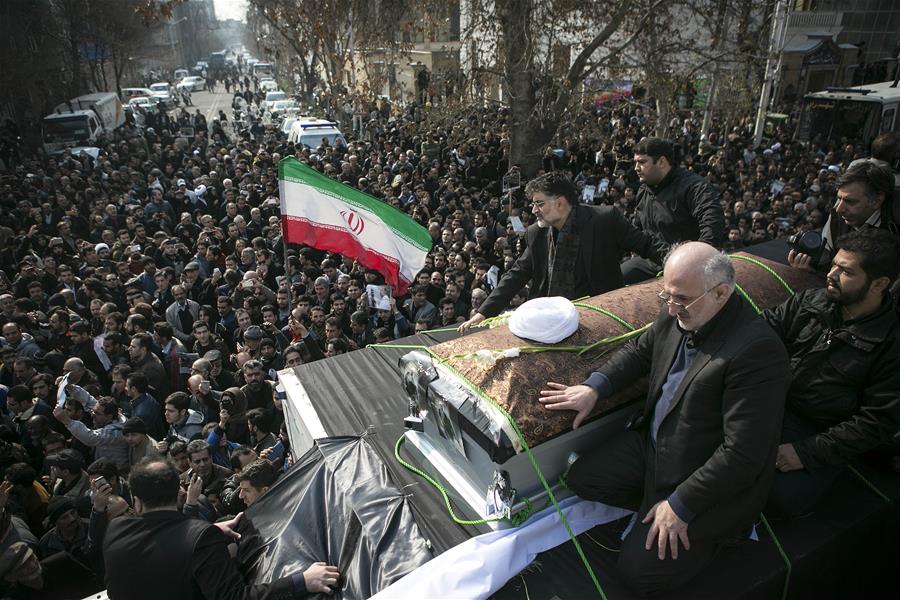TEHRAN, Jan. 10 (Xinhua) -- Hundreds of thousands of people took part in the funeral ceremony of Iran's former President Akbar Hashemi Rafsanjani on Tuesday.

People attend a funeral ceremony of Iran's influential cleric politician Akbar Hashemi Rafsanjani in Tehran, capital of Iran, Jan. 10, 2017. Rafsanjani died of a heart attack on Jan. 8 at the age of 82. (Xinhua/Ahmad Halabisaz)
People swarmed to the streets of capital Tehran to farewell the influential cleric who died at 82 out of the heart attack on Sunday.
Iran's Supreme Leader Ayatollah Ali Khamenei led the prayers for the dead body of Rafsanjani in the campus of the prestigious Tehran University.
The coffin was moved through the streets in central Tehran to finally be transferred to the mausoleum of the late founder of the Islamic republic, Ayatollah Ruhollah Moosavi Khomeini, in the south of capital.
In his message, Iran's Supreme Leader Ayatollah Ali Khamenei expressed grief over the sudden demise of an old friend, fellow and ally during the 1979 Islamic revolution and close colleague during the post-Islamic revolution period, according to Press TV.
Khamenei said that Rafsanjani's loss is overwhelming and very hard to bear as he was a reliable support for the leadership of the country.
On Sunday, President Rouhani's administration announced three-day mourning. The announcement said that all governmental institutions would be closed on Tuesday for the funeral ceremony.
Rafsanjani death poured in condolences from the world leaders and governments.
On Monday, China extended its deep condolences to Iran following the death of Rafsanjani.
Calling Rafsanjani an "influential leader," spokesperson of Chinese Foreign Ministry spokesperson, Lu Kang, said that China offered sympathy to the government and people of Iran, as well as Rafsanjani's relatives.
Lu spoke highly of Rafsanjani's contributions to bilateral ties between Iran and China during his presidency.
Born in August 1934 in Iran's Bahreman, Rafsanjani was an influential moderate politician, religious scholar and the confidant of Ayatollah Khomeini.
According to Press TV, Rafsanjani helped establish the Combatant Clergy Association in 1977, which proved fatefully instrumental in the victory of the Islamic revolution against the U.S.-backed Shah regime two years later.
Rafsanjani was a member of the Assembly of Experts since 1983. He was elected as the head of the assembly from 2007 till 2011, but then he decided not to nominate himself for the post. He was the chairman of the Expediency Discernment Council of the Establishment at the time of his death.
Rafsanjani was elected chairman of the Iranian parliament in 1981 and served until 1989. He served as president of Iran from 1989 to 1997. In 2005, he ran for a third term in office, placing first in the first round of elections but ultimately losing to hardline rival Mahmoud Ahmadinejad in the run-off round of the 2005 presidential election.
He has been described as a pragmatic centrist. He supported a free market position domestically, favoring privatization of state-owned industries, and a moderate position internationally, seeking to avoid conflict with the U.S. and the West.
In May 2013, Rafsanjani entered the race for the June 2013 presidential elections, but he was not qualified by the Guardian Council. Instead, he supported the incumbent President Hassan Rouhani.















